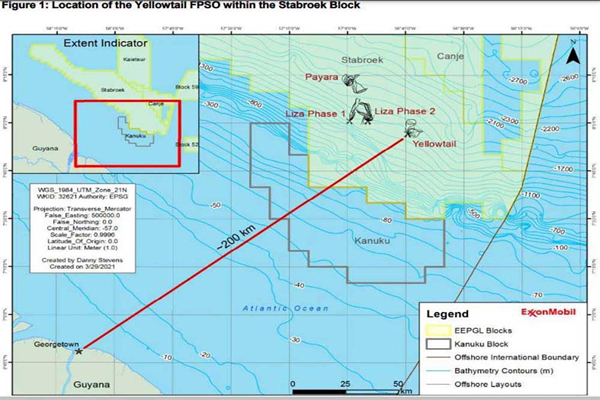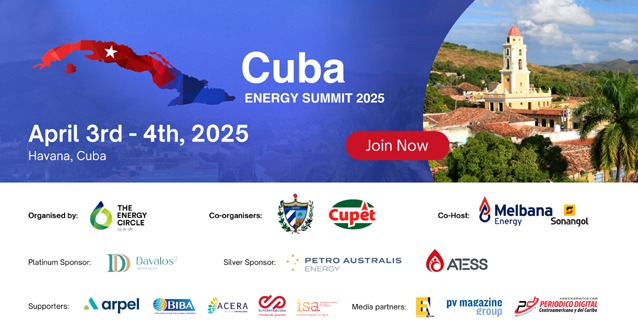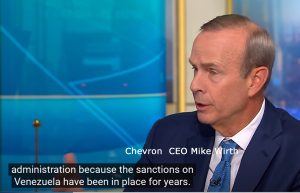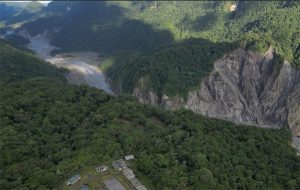
Davina Bagot, Kaieteur News
GEORGETOWN
EnergiesNet.com 24.03 2022
Fishermen in Guyana have been complaining bitterly of low catches over the past months, blaming the situation on oil giant, ExxonMobil’s operations offshore.
But even though high ranking government officials have shot down this claim, arguing that there is no data to prove this, Exxon’s subsidiary, Esso Exploration and Production Guyana Limited (EEPGL), which is gearing to startup production at the Yellowtail development, has warned that its operations can impact fish within the project site.
This information is included in EEPGL’s Environmental Impact Assessment (EIA), a document the company is mandated to submit, which outlines the effects its operations can have on the environment.
Yellowtail is Exxon’s fourth project, situated in the Stabroek Block of Guyana’s Exclusive Economic Zone (EEZ).
According to the report, marine fish could be impacted as a result of deteriorated water quality, from discharges generated during the project. In addition to poor water quality, acoustic effects or noise from the company’s operations can also cause fish to be impacted. These species can also be sucked into the equipment which Exxon will be utilising for oil production, the impact assessment cautioned.
Section 3. 1. 5 of the EIA states, “The Project could impact marine fish by deterioration of water quality from the discharges described above, acoustic effects, and the potential to entrain (suck in) fish at the cooling water intake.”
The document goes on to explain that the affected area will be “very small” and that fish are known to avoid areas with degraded water quality. Measures will also be taken to minimise the entrainment or ‘sucking in’ of fish by the equipment.
“Modeling indicates that water quality will return to near background conditions within 100 meters (approximately 328 feet) of the FPSO (Floating Production Storage and Offloading vessel), so the area impacted will be very small, and fish are mobile and are known to avoid areas with degraded water quality. Water intakes will be designed to minimize the entrainment of fish,” the report explains.
It further cautions that several special ‘status marine fish’ species are known to be present in the Project’s ‘area of influence’. The significance of potential residual impacts on marine fish, according to the EIA, was considered to be negligible to minor, or for some special status offshore marine fish species, moderate.
At Section 3. 1. 2, the document explains that the Project will impact marine water quality in a localized manner, via planned discharges during well drilling, hydrostatic testing of the flowlines and risers following installation, and production operations stages.
EEPGL has proposed to dump ballast water, produced water, as well as its domestic and sanitary wastewater, among others into the sea.
In a previous article, this newspaper reported that while international best practices dictate that toxic water which is brought up from reservoirs during oil extraction is supposed to be re-injected into separate wells, the ExxonMobil subsidiary, EEPGL has proposed to do the opposite for its Yellowtail project.
According to the project summary, it submitted to the Environmental Protection Agency (EPA), ExxonMobil wants to dump this toxic water into the ocean.
The document notes that the treated produced water and cooling water will be discharged overboard as per industry best practices.
It should be noted however that this water is only supposed to be dumped into the ocean after it has been proven that it is not financially feasible to reinject same, and the water would have no harmful effects on the marine life surrounding the project.
Last December, Vice President Bharrat Jagdeo denounced the observations made by fishermen across the country, that the recent oil and gas operations have negatively impacted their catch.
Jagdeo said, “Now there is no scientific view, for example, that the oil and gas industry cause the fish to swim away from Guyana and he (KN Publisher, Glenn Lall) is telling the fishermen that the fish swim away; now if we can prove that, that’s great but there’s no scientific view of that”.
The Vice President went on to explain that he grew up in the fishing community of Unity, Mahaica, East Coast Demerara, where since he was a young boy, the catch would be low in certain seasons.
“I grew up in a fishing village, in Unity. There are periods when we have had low catch too. The guys would go out many, many times and didn’t bring in any(thing) much and that was long before we were producing oil, since I was a young boy,” he told the nation during the interview aired on the National Communications Network (NCN) and online.
As a consequence, Jagdeo implied that it would be irresponsible to attribute the decline in fish catch across the country to ExxonMobil’s operations.
However, when the first six months of 2019, 2020 and 2021 were compared, it was revealed that for the past two years, fish and shrimp production has been declining. This was evident in the recent Bank of Guyana (BoG) Half-Year Report.
kaieteurnewsonlines.com 03 23 2022












